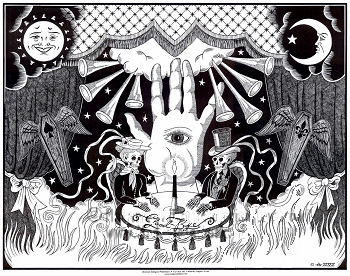Spiritualism

|
Spiritualism began in the United States in the 1840s, following the American Civil War and spread to a variety of other English-speaking countries. Inspired by the writings of Emanuel Swedenbourg, who claimed direct experience with spirits and angels that revealed the structure of the spirit world, spiritualists are theists who believe that there is no single heaven or hell. Rather, the afterlife is made up of a series of spiritual layers, which both descend and ascend from the mortal plane; furthermore, they also believe that sometimes, when people die, they linger as spirits that God occasionally uses as a means of communicating with the living.
Spiritualism also believes in the existence of angels and other spirits, but believe that these entities rarely interact with humanity. Spiritualism also embraces the techniques of Franz Mesmer and his so-called "hypnotism" as a means of gaining communication with the myriad spirits that may have message for the yet-living. Many followers of spiritualism believe that communion with these entities can also grant clairvoyance and faith healing.
Spiritualism truly took root in the aftermath of the American Civil War, after people all over the nation lost loved ones in what seemed like senseless violence. Even Mary Todd Lincoln, the widow of Abraham Lincoln, hosted a séance in the White House in an attempt to contact her husband's spirit. For the first fifty years of its existence, it went without any kind of organization or textual basis, being made up of charismatic esotericists and mediums, many of whom were women. Indeed, spiritualism had a great number of links to early womens' liberation movements, and may of its adherents supported womens' suffrage.
Toward the end of the Victorian Era, spiritualism had attracted more than its fair share of charlatans and con-men, who used slippery techniques to fool others into believing that their parlour tricks were actual manifestations of the spirit world.
Contents
Prerequisites
Meditative Mind Merit, plus Academics 1, Empathy 2, Occult 2
Tradition Skills
- Academics: Spiritualism is based on fairly obscure academic and philosophical works from the past several centuries. Many skilled mediums are also knowledgeable historians as well.
- Empathy: Sensitivity to emotional currents, whether in those around them or in the ghosts they seek to contact is considered vital in a skilled medium.
- Larceny: Sadly, there is a reputation of charlatanism that haunts spiritualism. Unscrupulous mediums are only too happy to fake manifestations, while more honest ones take pride in knowing all the dirty tricks in order to reveal the fakers in their midst.
- Occult: A knowledge of the spiritual world, and a sensitivity to the activities of the Unseen is vital for the adept spiritualist.
- Persuasion: Much of the hardest work of spiritualism involves not only convincing the dead to make themselves manifest, but in getting those who are otherwise skeptical to abandon their doubts long enough to create an environment appropriate for such manifestations.
Praxis
- Spiritual Intercession:
- Mediumship:
- Clairvoyance:
- Faith Healing:
Correspondences
- Séance:
- Mesmerism:
- Tokens:
- Ouija Board:
Higher Mysteries
- Communion with the Dead (•••): A spiritualist who uses Death magic to interact with a ghost may spend 1 Willpower to cause himself to be treated as an Anchor for that ghost.
- Séance (••••): The Awakened spiritualist's adeptness with rituals involving the dead is so acute that his Gnosis is considered one dot higher for the purpose of determining the extended roll interval for ritual casting of Spiritualism tradition rotes.
- Strangeness in the Dark (•••••): Those who agree to participate in a séance-style ritual casting of any spell involving ghosts are treated as though they had the Magical Tradition: Spiritualism Merit for the purpose of determining the effects of their presence on that magic.
Typical Spiritualism Rotes
The following are some of the most commonly taught Spiritualism rotes.
NAME (ARCANA •••••)
- Spell: X
- Dice Pool: X
- Factor Bonuses: X
- Tradition Rote: X